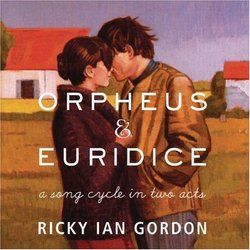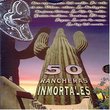| All Artists: Ricky Ian Gordon Title: Orpheus and Euridice Members Wishing: 0 Total Copies: 0 Label: Ghostlight Original Release Date: 1/1/2007 Re-Release Date: 1/23/2007 Genres: Pop, Classical, Broadway & Vocalists Styles: Vocal Pop, Musicals Number of Discs: 1 SwapaCD Credits: 1 UPCs: 791558441727, 829410273565 |
Search - Ricky Ian Gordon :: Orpheus and Euridice
 | Ricky Ian Gordon Orpheus and Euridice Genres: Pop, Classical, Broadway & Vocalists
|
Larger Image |
CD DetailsSimilar CDs
|
CD ReviewsA stunning piece Kyle J. Parker | 06/20/2007 (5 out of 5 stars) "While researching new composers (specifically anyone who was following in the tradition of Stephen Sondheim) I was blessed to come across Ricky Ian Gordon. I was familiar with his work that Ms. Audra McDonald had presented in her "Way Back to Paradise" album but had yet to investigate further into his art. Luckily I found "Orpheus and Euridice." The poetry is evocative in it's own right, the music brings us to a deeply personal world within it and the ensemble that has been presented to us has taken this piece and made it's glorious passages soar. It is quite obvious that Mr. Gordon has found a personal connection his writing. Ranging from playfull to heartwrenching the listener finds themselves taken to a whole new level of expression that we won't find very often in the world of music today. I should warn those reading that this music is not deeply rooted in traditional tonality. It seems that Mr. Gordon has taken a directional cue from Sondheim and is branching out to the capabilities of music beyond the usual palette of popular music. If you are more accustomed to traditional broadway music I would suggest spending some time enjoying the wonderful work of Stephen Sondheim and Adam Guettel, specifically pieces such as Sweeney Todd, A Little Night Music and The Light in the Piazza. Once you have become accustomed to pieces such as those then I would greatly encourage you to explore this work. Believe me that this piece is worth the investment. I hope you find as much beauty and enjoyment in this CD as I have." Rick Hamlin's Opera News Review C. Feliciano | Pittsburgh, PA | 11/01/2008 (5 out of 5 stars) "Orpheus & Euridice CHORAL AND SONG GORDON, Orpheus & Euridice Orpheus Ascending! -------------------------------------------------------------------------------- At first, one might think Orpheus has given up his mythic lyre for a clarinet in Ricky Ian Gordon's haunting two-act song cycle Orpheus & Euridice. But Gordon means something a lot less literal and more poignant here; the clarinet is not so much the instrument Orpheus plays as the sound of his inner music - his longing, joy and pain. And in the hands of clarinetist Todd Palmer, the point is beautifully made. In 1995, Palmer approached Gordon with the suggestion that he compose a piece for clarinet, soprano and piano, a modern answer to Schubert's Der Hirt auf dem Felsen (The Shepherd on the Rock). At the time, Gordon's partner was dying from AIDS, and the composer wasn't sure he was up to the assignment. Then one morning, Gordon woke up with the inspiration to cast Palmer and his clarinet as Orpheus, grieving a Euridice plagued with a virus rhat takes her away. The piece was first staged at Cooper Union in Manhattan in 2001; the current recording is based on Gotdon's expansion of Orpheus, as staged by Doug Varone at Lincoln Center in 2005. Gordon claims to have written the libretto in one hour, but there's nothing facile about it. Graceful, soulful, inspired and personal, it sets the Orpheus story in a modern context. This couple gets a little more time on earth than the fabled pair - plus a house, a garden and a chance to dance (an interlude in which pianist Melvin Chen sets the clarinetist Palmer free). Soprano Elizabeth Futral delivers the story's third-person narracion with full emotional involvement, as well as singing the song Orpheus wrote for Euridice, "I am parr of something now." When death takes Euridice away, Orpheus follows her to a hell "you had to pass through. Like life, you had to traverse through the night / To circumnavigate the light." He makes his deal and brings her back but of course cannot resisr looking back any more than any grieving lover can resist looking back. Euridice disappears, and Orpheus is torn apart - would that this CD could let us see Doug Varone's choreography. Music born of grief and sorrow becomes its own consolation. Taking a myth that is irresistible to composers, Gordon has written a song cycle that makes great theater. In this recording, Futral's voice is ripe with yearning, and pianist Melvin Chen is sharp and tuneful - but it is Todd Palmer who proves that a clarinet can charm the gods as it revives the soul.- Rick Hamlin, Opera News, 1 March 2007" Peter G. Davis on "Orpheus and Euridice" in New York Magazin Ian Lincoln | Dayton,Ohio | 09/11/2008 (5 out of 5 stars) "Ricky Ian Gordon's Orpheus and Euridice is so intimate and private
that one almost feels intrusive commenting on it. Orpheus, which recently received its world premiere in Lincoln Center's "Great Performers" and "American Songbook" series, was written as a response to the illness and death of Gordon's partner. All composers drawn to this Greek legend are surely in some way attracted by the bereavement, guilt, and grieving that the myth explores, not to mention the fact that Orpheus himself is the virtual embodiment of music and its grieving that the myth explores, not to mention the fact that Orpheus himself is the virtual embodiment of music and its power to move, heal, and restore. Gordon has clearly been stirred by all that, reshaping the basic material in original ways to make his own statement. What began as a modest request from clarinetist Todd Palmer for a companion to Schubert's ballad The Shepherd on the Rock eventually developed into a 70-minute theater piece that, like the Schubert song, calls for soprano, clarinet, and piano but also adds a troupe of dancers. The soprano doubles as Euridice and a narrator, Orpheus exchanges his lyre for a clarinet with no loss of musical eloquence, and eight dancers represent the Furies, blessed spirits, and, in the end, a moved audience of wondering humanity. Both Gordon's text and music are couched in an accessible idiom of disarming lyrical directness, a cleverly disguised faux naïveté that always resolves dissonant situations with grace and a sure sense of dramatic effect--the mark of a born theater composer. Not many new works, especially one with these unusual requirements, get such a magical first performance in which every element seems so perfectly integrated. As directed and choreographed by Doug Varone, the action is in constant movement--even the pianist (Melvin Chen) and his instrument are whirled about the stage at certain key moments. Soprano Elizabeth Futral as Euridice and Palmer as Orpheus perform their regular musical duties to maximum effect while joining in the dance without a suggestion of hesitation or awkwardness. The otherworldly nature of Allen Moyer's gray gauze settings and Jane Greenwood's pale costume designs couldn't be more to the point. Orpheus and Euridice is a fragile creation, and it was lucky to be born with such tender care." |

 Track Listings (15) - Disc #1
Track Listings (15) - Disc #1


